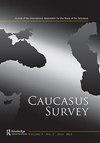代表格鲁吉亚的重大事件和想象领土完整:建设者大卫和迪戈里战役的文化记忆
IF 0.4
Q3 AREA STUDIES
引用次数: 0
摘要
摘要:领土完整是当代格鲁吉亚文化记忆和历史想象中的中心比喻之一。这篇文章追溯了中世纪格鲁吉亚国王大卫四世在1121年8月的迪戈里战役中“奇迹般地战胜了塞尔柱土耳其人”并夺取了第比利斯的故事何时、如何以及为什么进入了格鲁吉亚的“记忆领域”。这种复杂且往往矛盾的记忆遗产,由中世纪、帝国(沙皇和苏联)和民族国家(第一共和国和后苏联的格鲁吉亚)的结合所形成,为目前将这种军事成功作为格鲁吉亚国家统一的象征提供了素材。在苏联和后苏联的“记忆政权”中,Didgori和重新征服第比利斯的故事与领土民族主义交织在一起。在苏联-格鲁吉亚的单线叙事中,这些胜利表现为“进步”和统一的事件。在后苏联时期,民族宗教民族主义和对大卫形象的重新神圣化,以及对国家领土完整的挑战,促使格鲁吉亚人放大和放大选定的辉煌过去的图像。这些历史事件代表了该国历史上一个决定性的光辉事件,为类似的胜利和恢复国家领土完整带来了希望。本文章由计算机程序翻译,如有差异,请以英文原文为准。
Representing fateful events and imagining territorial integrity in Georgia: cultural memory of David the Builder and the Battle of Didgori
ABSTRACT Territorial integrity is one of the central tropes in contemporary Georgian cultural memory and historical imaginaries. The article traces when, how, and why the narrative of the “miraculous victory” of medieval Georgian King David IV the Builder over Seljuk Turks in the Battle of Didgori in August 1121 and his seizing of Tbilisi entered the Georgian “realms of memory”. This complex and often contradictory mnemonic legacy, shaped by medieval, imperial (Tsarist and Soviet), and nation-state (the First Republic and post-Soviet Georgia) conjunctures, feeds the current representations of this military success as a symbol of the unification of the Georgian state. In the Soviet and post-Soviet “regimes of memory”, the story of Didgori and reconquering Tbilisi became intertwined with territorial nationalism. In the unilinear Soviet Georgian narrative, these victories appear as “progressive” and unifying occurrences. In the post-Soviet period, ethnoreligious nationalism and re-sacralization of David’s image and the challenges to the country’s territorial integrity motivated Georgians to zoom in and magnify selected images of the glorious past. These historical events represent a fateful and luminous episode in the nation’s history that fed hope for an analogous victory and restoration of the country’s territorial integrity.
求助全文
通过发布文献求助,成功后即可免费获取论文全文。
去求助
来源期刊

Caucasus Survey
Arts and Humanities-History
CiteScore
1.30
自引率
9.10%
发文量
4
期刊介绍:
Caucasus Survey is a new peer-reviewed, multidisciplinary and independent journal, concerned with the study of the Caucasus – the independent republics of Armenia, Azerbaijan and Georgia, de facto entities in the area and the North Caucasian republics and regions of the Russian Federation. Also covered are issues relating to the Republic of Kalmykia, Crimea, the Cossacks, Nogays, and Caucasian diasporas. Caucasus Survey aims to advance an area studies tradition in the humanities and social sciences about and from the Caucasus, connecting this tradition with core disciplinary concerns in the fields of history, political science, sociology, anthropology, cultural and religious studies, economics, political geography and demography, security, war and peace studies, and social psychology. Research enhancing understanding of the region’s conflicts and relations between the Russian Federation and the Caucasus, internationally and domestically with regard to the North Caucasus, features high in our concerns.
 求助内容:
求助内容: 应助结果提醒方式:
应助结果提醒方式:


